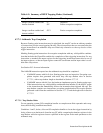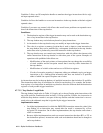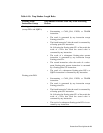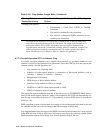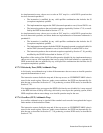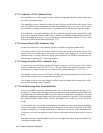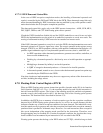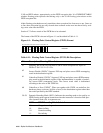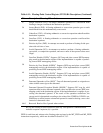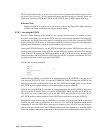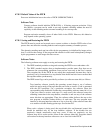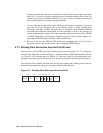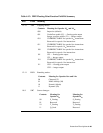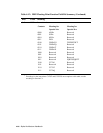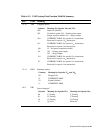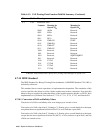
Instruction Descriptions 4–81
FPCR is read from and written to the floating-point registers by the MT_FPCR and MF_FPCR
instructions respectively, which are described in Section 4.7.8.1.
57 Integer Overflow (IOV). An integer arithmetic operation or a conversion from
floating to integer overflowed the destination precision.
56 Inexact Result (INE). A floating arithmetic or conversion operation gave a result
that differed from the mathematically exact result.
55 Underflow (UNF). A floating arithmetic or conversion operation underflowed the
destination exponent.
54 Overflow (OVF). A floating arithmetic or conversion operation overflowed the
destination exponent.
53 Division by Zero (DZE). An attempt was made to perform a floating divide oper-
ation with a divisor of zero.
52 Invalid Operation (INV). An attempt was made to perform a floating arithmetic,
conversion, or comparison operation, and one or more of the operand values were
illegal.
51
Overflow Disable (OVFD)
†
. Suppress OVF trap and place correct IEEE nontrap-
ping result in the destination register if the implementation is capable of produc-
ing correct IEEE nontrapping results.
50
Division by Zero Disable (DZED)
†
. Suppress DZE trap and place correct IEEE
nontrapping result in the destination register if the implementation is capable of
producing correct IEEE nontrapping results.
49
Invalid Operation Disable (INVD)
†
. Suppress INV trap and place correct IEEE
nontrapping result in the destination register if the implementation is capable of
producing correct IEEE nontrapping results.
48
Denormal Operands to Zero (DNZ)
†
. Treat all denormal operands as a signed zero
value with the same sign as the denormal.
47
Denormal Operand Exception Disable (DNOD)
†
. Suppress INV trap for valid
operations that involve denormal operand values and place the correct IEEE non-
trapping result in the destination register if the implementation is capable of pro-
cessing the denormal operand. If the result of the operation underflows, the
correct result is determined according to the value of the UNDZ bit. If DNZ is set,
DNOD has no effect because a denormal operand is treated as having a zero value
instead of a denormal value.
46–0 Reserved. Read as Zero. Ignored when written.
†
Bit only has meaning for IEEE instructions when any valid qualifier combination that
includes
exception completion (/S) is specified.
Table 4–11: Floating-Point Control Register (FPCR) Bit Descriptions (Continued)
Bit Description (Meaning When Set)



